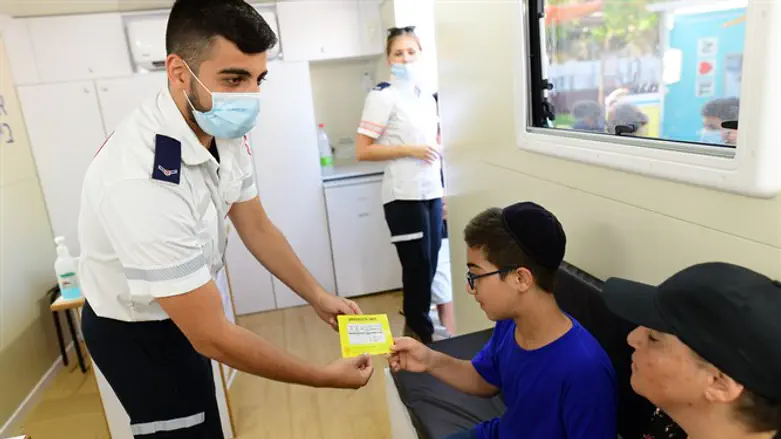
A joint study by the Clalit Research Institute and Harvard University was published on Wednesday in the leading medical journal New England Journal of Medicine.
The research team analyzed Clalit's data, using advanced methods, in order to test the effectiveness of the first and second doses of the Pfizer COVID-19 vaccine in adolescents aged 12-18 against the Delta strain.
The study included people who received the vaccine between June 8 and September 14, 2021, during the fourth wave of the pandemic. The research method is similar to previous studies that Clalit conducted and were published in the same journal.
The researchers reviewed data from 94,354 vaccinated adolescents aged 12 to 18, who were carefully matched to a control group of 94,354 unvaccinated adolescents with identical data in terms of demographics, geography, clinical background, and health behaviors associated with COVID-19 infection risk.
The adolescents were divided into groups dynamically based on their changing vaccination status (during the study period, the status of 13,423 of them changed from unvaccinated to vaccinated). The research method included a detailed adjustment of personal and clinical characteristics between the groups and allows potential biases to be overcome.
The wide group size allowed for a more accurate assessment of vaccine efficacy over different time periods after vaccination.
The study found that among fully vaccinated adolescents (one week or more after receiving the second vaccine dose), a 93% reduction in disease with symptoms compared with unvaccinated and a 90% reduction in documented cases was observed.
The study does not provide an accurate estimate of the effect of the vaccine on the intensity of reduction in cases of serious illness, as not enough information has yet been accumulated on this outcome in this age group, due to the relative rarity of serious illness in adolescents.
Prof. Ran Balicer, head of Clalit's innovation division, said, "With the outbreak of the fourth wave due to the Delta variant, the question arose as to whether the vaccine used in Israel also provides adequate protection against this variant, as it protected against the Alpha variant after the vaccination campaign in January. Because most adolescents were first vaccinated during this wave, evaluating the effectiveness of the vaccine in them can provide an answer to the question."
"The results of the study show unequivocally that the vaccine is most effective in reducing infection in the Delta strain and preventing symptomatic disease one week after receiving two doses. The results of the study show that the intensity of protection against the Delta strain is very similar to that observed in young adults against the Alpha strain six months ago. These conclusions provide important and well-founded information for parents who are undecided about vaccinating their adolescent children," added Balicer.
Prof. Ben Reis, director of the Predictive Medicine Group at Boston Children's Hospital and Harvard Medical School, said, "The results of this observational study, which complements the clinical research conducted by Pfizer, provide well-established scientific evidence regarding the efficacy of the vaccine in preventing infection and serious illness among adolescents as well as the efficacy of the vaccine against the Delta variant, which is currently the dominant variant in Israel and around the world."
